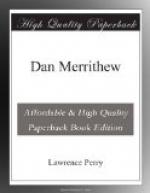“Yes, I know,” replied the girl, softly. She turned her face from the silvery path on the water.
“And you are not going to stop fighting. Oh, you will not stop! You will go on and on. Men like you never stand still. I know it is the truth. What difference can your past life make to your friends? It is never what a man was or might have been that counts, or what he may be; it is what he is.”
And then she turned and left him.
One evening as the dark came creeping over the purple waters, the Tampico cluttered up to the mouth of the harbor of San Blanco City. Captain Merrithew and Mr. Howland stood on the bridge, while Virginia and most of her guests were assembled at the rail, all eyes straining shoreward. A rattle of musketry tore through the evening air—a muzzle-loading cannon spoke grouchily; then all was still. A sailboat was drifting out to sea and the fishermen, being hailed, informed those on the steamship that revolutionists were pounding at the city walls and pounding hard, but thus far without avail. The uprising, as usual, they said, had its inception in the fastnesses of Monte-Cristi and, spreading through the country, had brought up with a bang against the walls of the city itself.
Mr. Howland was seriously perturbed.
“We must get in quickly and land our guns, Captain,” he said. “It’s too bad we have this party with us. However, you must not consider their comfort. If you land this cargo of ordnance, we can break the revolution easily and pleasantly.”
He glanced at the Blancan navy—two gunboats, formerly pleasure yachts, and a “battleship,” once a steam-lighter—which lay at strategic intervals across the harbor mouth and moved impatiently.
“The scoundrels!” he ejaculated. “Why don’t they shell those insurgents? They could end this promptly if they wished to. I shall have something pleasant to say to them and to Senor Gaspard of the Marine when I see him. Still, perhaps they are waiting for me. President Rodriguez expects us.”
Mollified at this thought, Mr. Howland straightened to a dignified and commanding posture. The honors accorded an arriving Howland vessel were the honors accorded a United States warship, and he scanned the fleet eagerly for the first sign of the invariable welcome. He turned to Dan.
“Better dive into your cabin, Captain, and get on your double-breasted regalia,” he said. “There will be a round of diplomatic calls and felicitations generally—and of course they will ask for wine; for of all half-starved, thirsty natives, give me those of this bob-tailed republic.”
The fighting had evidently stopped for the night, and Mr. Howland waved his hand at the flag-ship. He dearly loved all the punctilio of international etiquette and the deference that had ever been his portion in San Blanco.
And so this captain of industry smiled and hearkened for the first gun of the expected salute. But it did not come. There was silence somewhat grim and certainly sullen. He ground his teeth impatiently, angry disappointment growing as they drew near the fleet. “What is the matter with those rascals?” he growled, turning to Dan, who, resplendent in blue and gold, had just joined him on the bridge.




